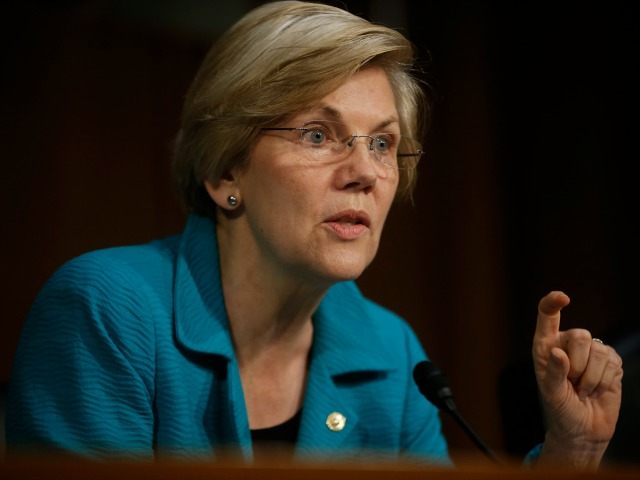Senator Elizabeth Warren (D-Mass) has not commanded much public attention since Hillary Clinton started channeling Warren’s book, Fighting Chance, which claims the “system is rigged” against the middle class because it is controlled by and for the elites who tilt the game in their favor. But in a bold effort to take all the oxygen out of the Clinton campaign, Senator Warren (D-Mass.) laid out a bare-knuckles legislative road map on Wednesday to kick Wall Street in the teeth.
On Tax Day, the Left’s favorite spear-chucker proposed in a paper titled “The Unfinished Business of Financial Reform” to reign in Wall Street with harsh taxes on high-frequency trading, make it costly for banks to take on large amounts of debt, toughen regulation of “shadow banking,” and drastically limit the paychecks of bank CEOs.
In the paper, Warren also lambasts regulators for taking too light of a touch with the nation’s biggest banks and urges them to take on the top financial firms and the people who run them. She accuses a spineless Justice Department and the Securities and Exchange Commission for being infected by a “slap on the wrist culture” that lets financial institutions commit wrongdoing and clear their record by “paying a fine.”
According to Warren, “The moral of this story is simple: without basic government regulation, financial markets don’t work.” She argues that without aggressive regulation, “People get ripped off, risk-taking explodes, and the markets blow up. That’s just an empirical fact–clearly observable in 1929 and again in 2008.”
Warren’s expects her robust plan will initially enjoy no traction in the Republican-dominated House and Senate, which are working to relax existing rules. She describes their effort as 1980s-type “deregulation” that sought to “fire the cops” on Wall Street.
Warren says, “The Fed and other bank regulators looked the other way as big financial institutions found new ways to trick their customers, first through credit cards and then through mortgages, home equity lines of credit, and a raft of new financial products,” like mortgage pools that were “boxes full of grenades with the pins already pulled out.”
By going all-in for the extreme left of the Democratic Party, Warren wants to actualize an army of true believers to carry her message enthusiastically. She challenges her acolytes to take the disruptive opportunity to show “political courage” and to go on the offensive to expand Dodd-Frank’s regulatory regime, rather than joining an impotent Democrat establishment that at best is trying only to limit the roll-back.
Warren has a new message now. “Our economy suffers when those who can hire armies of lobbyists and make huge political contributions can decide what the financial cops can and cannot do. Our democracy suffers when Congress puts the interests of a handful of giant banks ahead of the needs of 320 million American citizens,” she said. “If the big banks keep calling the shots, they will own both our economy and our democracy.”
To pay for her regulatory state, Warren wants Congress to follow Europe in advocating for a financial transaction tax on both sides of every stock, bond and derivative trade. Warren argues that the tax would bleed to death high-frequency traders, who profit on “gimmicks that add no value to the economy.”
Senator Warren points out that the Dodd-Frank financial reforms recognized that bank CEOs’ pay should be aligned with the long-term interests of the stability of the corporation and the economy. But she says that five years later, the SEC can’t seem to figure out how to write those rules.
Warren wants Congress to change the tax code so executive pay-for-performance is not tax deductible for banks. She states that incentivizing bank performance is a short-sighted approach that “encourages risk-taking and makes long-term projects undesirable.”
Warren also takes on auto dealers by calling on Congress to undo the special exemption that prevents the Consumer Financial Protection Bureau (CFPB) from looking into auto “predatory and discriminatory lending practices” and markups.
Warren likens her call to action to the type of trust-busting crusade led by Teddy Roosevelt. Teddy wanted to limit the power of corporations “to interfere in politics in order to secure privileges to which [they are] not entitled.”
She believes that key steps are not difficult. Rather, she says, it “just takes political courage and a strong demand from the public to complete the unfinished business of financial reform.”
A political entrepreneur arises in every presidential contest to blame their own party for not having the guts to go big. Senator Elizabeth Warren, by angering a huge part of the Clinton funding base, is reinforcing the perception that Hillary Clinton is too old and too much a part of the problem to be the Democrat nominee.

COMMENTS
Please let us know if you're having issues with commenting.